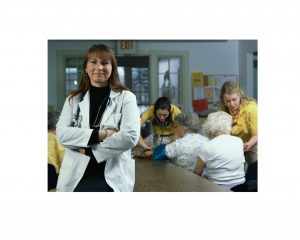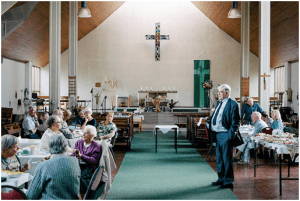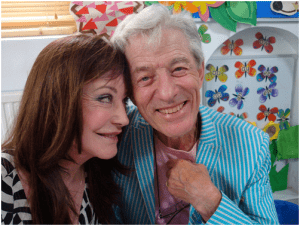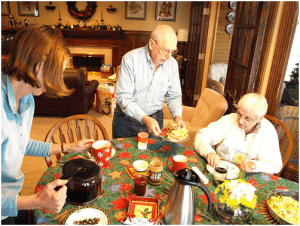Dr. Mauk’s Boomer Blog
Each week, Dr. Kristen Mauk shares thoughts relevant to Baby Boomers that are aimed to educate and amuse.
Dr. Kristen L. Mauk, PhD, DNP, RN, CRRN, GCNS-BC, GNP-BC, FAAN

Guest Post: Natural Treatment of Psoriasis Through Oil Therapy
Psoriasis is a chronic skin ailment caused genetically, triggered by environmental factors. A psoriasis patient shows symptoms like scaling, itching, abrasions and localized redness. P
Affected people are also prone to other health problems like diabetes and heart diseases. It is not contagious, but difficult to cure completely. There are many effective remedies for Psoriasis like medications and skin therapy using essential oils.
Essential oils are used for aromatherapy and oil therapy to treat psoriasis. A lot of research is still needed in the direction of skin treatment using essential and carrier oils. One must also test skin sensitivity for side effects of oils. One should consult a doctor prior to having oils in their treatment regime for psoriasis.
Coconut oil
With its natural anti-inflammatory properties, coconut oil can help in reducing scalp pain. Lauric acid, the primary ingredient in coconut oil blocks bacteria and viruses from getting inside the body. Coconut oil can be taken internally or applied externally over the affected dry scalp surface. One can ingest 2 tablespoons of virgin coconut oil in food every day. Else, coconut oil can be applied on skin directly after taking bath.
Tea tree oil
Tea tree oil is an exotic product, as it is produced using leaves of a native Australian plant. Its natural properties protect body from infestation of bacteria, fungi and viral action. Applying tea tree oil over a psoriasis affected area minimizes any risk of infection. It also brings down the inflammation caused due to Psoriasis. Not only this, tea tree oil also enhances body immunity.
Tea tree oil is available in lotions and soaps. One should however be careful of allergic responses. One must apply only limited quantities to prevent its side effects. It is preferable to test tea tree oil over a small area of skin to find if the person is allergic to it. A lot of research is still to be done to find the benefits and side effects of tea tree oil.
Castor oil
Castor oil is used as the base for essential oils and has a softening or lubricating effect on the skin. It reduces flaking on Psoriasis affected skin if used regularly. It also increases the healing speed of skin. Castor oil when directly applied on skin detoxifies it. By raising lymphocyte count, it raises body immunity.
Lavender oil
It is one of the best known therapies for Psoriasis and other skin problems. Lavender oil has treated skin problems in cases where other forms of medication have failed. The application of Lavender oil upon skin protects it from bacterial and fungal infestation. In addition, it also protects skin from abrasions, muscular pains and headaches.
By applying Lavender oil on your temples, stress is minimized. It reduces itching sensation on skin. Diabetic patients should use Lavender oil in limited amounts. If the oil is used beyond prescribed limits, it may cause irritation, nausea, vomiting or headaches.
It can be mixed with lotion before application. A few drops of Lavender oil may be added to a carrier such as coconut oil to moderate the effects. Lavender oil may be added to water while taking bath for getting best results.
Geranium oil
Geranium oil reduces inflammation due to Psoriasis. It also improves circulatory system and helps in bringing down the stress levels. Geranium oil also enhances cell regeneration and renewal.
Geranium oil can also stop blood flow. So, people suffering from high blood pressure and those prone to cardiovascular ailments must use it with caution. Mixing geranium oil with carrier oil can be applied on psoriasis hit areas for best results.
It is better to test for side effects before applying it on skin. It can be diluted using a carrier oil for reducing side effects.
Peppermint oil
Peppermint oil is an effective cure for Psoriasis and other skin ailments. There are 25 species and 600 varieties of Peppermint, through which the oil is extracted. The curative ability of peppermint oil is attributed to menthol, its main ingredient.
Peppermint oil is harmless in limited dosages. But, otherwise there are chances that its application may cause allergic reaction on skin. One should rather test by applying over a small area of skin before actual use.
As a home remedy, 5 or 6 drops of peppermint oil are mixed with distilled water. The mixture is then sprayed on painful and itch-prone areas to stimulate skin relief.
Argan oil
Argan oil has anti-inflammatory as well as antiseptic properties. Because of such properties, it provides effective treatment for Psoriasis. Argan oil is a Vitamin E rich carrier oil. It helps in skin hydration and in enhancing skin’s metabolism.
It also reduces inflammation and protects skin from adverse effects of solar heat intensity. The oily part fights psoriasis symptoms such as redness, swelling, dryness and itching sensation. Argan oil can be applied directly over the Psoriasis affected parts. It can also be mixed with essential oils for proper action upon skin.
Black cumin seed oil
Black cumin seed oil protects skin from attack of bacteria, fungi, worms and viruses. It brings down intensity of skin inflammation in Psoriasis affected people. Simultaneously, it enhances skin’s healing process. It helps in minimizing scale thickness and also has a moisturizing effect on skin.
Black seeds have natural blood clotting properties. In addition, they bring down blood pressure levels. So they are safe for people affected with high blood pressure. Low pressure patients must first consult a doctor before using black seed oil for Psoriasis treatment.
One should also be wary of the intoxicating effect of overusing black seed oil. Black seed oil can be applied directly on human skin. Alternately, it can be mixed with a carrier oil prior to application on skin.
Consideration of risk factors
While applying a specific oil for psoriasis treatment, one should first research about it.
Essential oils and carrier oils have pharmaceutical properties. Hence, it is mandatory to follow the precautions for effective therapy . Essential oils must never be used beyond a certain quantity.
Also, it is better to consult a doctor to find the safe limits of essential oils to be applied for psoriasis treatment. Females must not use them in state of maternity or lactation.
Before application, one must meticulously go through product labels and follow attached instructions. One must know how the particular essential oil reacts with skin in order to meet the therapeutic purpose.
Michael Swift is a connector with Caffeinated who help businesses find their audience online. In his spare time, he reads books, writes for his blog reviewlatest.com and commits to do any activities that take place outdoors.
And the Oscar Goes to ….
And the Oscar Goes to…
Watching the Oscars can be quite entertaining. Imagine the vision, creativity, and artistry that it takes for scores of people to come together to make a film that captivates the country by bringing a story to life! The coveted gold statue represents the pinnacle of one’s profession, a universally recognizable prize that causes a seasoned actor to forget his acceptance speech or lose her gracefulness while tripping over a ridiculously expensive gown. It made me wonder: What if there were Oscars awarded to the people who influenced healthcare? Here are some suggestions for the most deserving:
Best Picture: an award for radiologists viewing the film of a cancer-free survivor
Actor/Actress in a Leading Role: the oncologists who don’t let their patients see them cry after having to give a terminal diagnosis
Actor/Actress in a Supporting Role: the nurse who provides comfort to the parents of a dying child
Best Adapted Screenplay: the rehabilitation team members who help survivors find new life again after stroke
Cinematography: for persons who capture the inspiring moments of the Special Olympics
Costume design: the prosthetists, orthotists, and biomechanical engineers who create both function and beauty to clothe persons needing artificial limbs
Directing: the heads of national organizations that lead the way in research and education in a specialty area
Best Makeup: the funeral home directors who help make our loved ones look their best for the final goodbye
Best Visual Effects: the burn specialists and plastic surgeons who reconstruct the facial features of a firefighter or war veteran after severe burns
Best Sound Mixing: the audiologists and manufacturers of hearing devices that help us to listen and attend to the sounds around us
Best Film Editing: the skilled surgeons who remove the bad parts and recreate our inward parts so that our life picture is the best it can be
Best Original Song: the one sung by the double lung transplant survivors, like Charity Tillman-Dick, and made possible by the lung transplant team
I wish that we gave such awards to the people who make a real difference in the lives of so many. There are hundreds of unsung heroes of healthcare who influence our world but go unnoticed. When you come across one, won’t you tell them how much they are valued and appreciated? They may never win an Oscar, but without them we couldn’t shine.
5th Most Common Cancer and Treatment
Background
This type of cancer occurs mainly in older adults, with an average age at diagnosis of 73 years, with 9 out of 10 cases of bladder cancer diagnosed in persons over age 55. The American Cancer Society (ACS)(2012) reported that over 73,000 cases were diagnosed in 2012 and that this diagnosis rate has been relatively stable over the last 20 years. Men are three times as likely to get cancer of the bladder as women (American Foundation for Urologic Disease, 2008) and the incidence increases with age.
Risk Factors
Risk factors include chronic bladder irritation and cigarette smoking, the latter contributing to over half of cases. Male gender and age are also risk factors.
Warning signs
The classic symptom of bladder cancer is painless hematuria (blood in the urine). Older adults may attribute the bleeding to hemorrhoids or other causes and feel that because there is no pain, it must not be serious.
Diagnosis
Assessment begins with a thorough history and physical. Diagnosis may involve several tests including an intravenous pyelogram (IVP), urinalysis, and cystoscopy (in which the physician visualizes the bladder structures through a flexible fiber-optic scope). This is a highly treatable type of cancer when caught early. In fact, the ACS (2012a ) estimates that there were more than 500,000 survivors of this cancer in 2012.
Treatment
Once diagnosed, treatment depends on the invasiveness of the cancer. Treatments for bladder cancer include surgery, radiation therapy, immunotherapy, and chemotherapy (ACS, 2012). Specifically, a transurethral resection (TUR) may involve burning superficial lesions through a scope. Bladder cancer may be slow to spread, and less invasive treatments may continue for years before the cancer becomes invasive or metastatic, if ever. Certainly chemotherapy, radiation, and immune (biological) therapy are other treatment options, depending on the extent of the cancer.
Immune/biological therapy includes Bacillus Calmette-Guérin (BCG) wash, an immune stimulant that triggers the body to inhibit tumor growth. BCG treatment can also be done after TUR to inhibit cancer cells from re-growing. Treatments are administered by a physician directly into the bladder through a catheter for 2 hours once per week for 6 or more weeks (Mayo Clinic, 2012a). The patient may be asked to lay on his/her stomach, back, and or sides throughout the procedure. The patient should drink plenty of fluids after the procedure and be sure to empty the bladder frequently. In addition, because the BCG contains live bacteria, the patient should be taught that any urine passed in the first six 6 hours after treatment needs to be treated with bleach: One cup of undiluted bleach should be placed into the toilet with the urine and allowed to sit for 15 minutes before flushing (Mayo Clinic, 2012a).
If the cancer begins to invade the bladder muscle, then removal of the bladder (cystectomy) is indicated to prevent the cancer from spreading. Additional diagnostic tests will be performed if this is suspected, including CT scan or MRI. Chemotherapy and/or radiation may be used in combination with surgery. When the cancerous bladder is removed, the person will have a urostomy, a stoma from which urine drains into a collection bag on the outside of the body, much like a colostomy does. Bleeding and infection are two major complications after surgery, regardless of type, whether a TUR or cystectomy is performed. Significant education of the patient related to intake/output, ostomy care, appliances, and the like is also indicated.
http://www.cancer.gov/cancertopics/wyntk/bladder/
Adapted from Mauk, K. L., Hanson, P., & Hain, D. (2014). Review of the management of common illnesses, diseases, or health conditions. In K. L.
Mauk’s (Ed.) Gerontological Nursing: Competencies for Care. Sudbury, MA: Jones and Bartlett Publishers. Used with permission.
How My Love for My Family Keeps Me Sober: Brandon’s Story
Family often plays a significant role in a recovering addict’s journey to sobriety. For Brandon, kin was not only what encouraged him to seek treatment, it’s ultimately what keeps him on the right track now that he’s clean.
Brandon experimented with painkillers after college and convinced himself he’d be fine, but it quickly took over his life.
“I had a second job: Getting high,” he said. “I’d wake up every morning worried about being sick or not being able to get anything.”
With time, his addiction made him unrecognizable in both appearance and personality.
“I wasn’t the funny, nice, sweet guy I had been,” he said. “By the third year of using, people started piecing it together — I had lost 50 pounds. I had always been athletic, in the gym every day … but I wasn’t focused on working out anymore. I would lie and tell people I was trying to lose weight.”
He had the most trouble hiding the truth from his family, and even his grandfather became suspicious.
“My grandpa kept bringing up stories about people he knew whose kids or grandkids were on heroin. Finally, one day, he flat-out asked me if I had a problem with drugs — and if I did, to let him know and he would help me,” Brandon recalled, noting that the conversation only temporarily slowed his habit.
Finally, his family could no longer remain silent. His parents confronted him, saying they knew there was more going on than he was admitting, and that they believed he needed professional help.
“I didn’t know what to say. I was ashamed, embarrassed and disappointed,” he admitted.
It took a few days to sink in, but finally Brandon agreed to enter addiction treatment. He said going to the Treehouse in Texas ended up being one of the best decisions he ever made. He rediscovered his passion for life and committed to getting sober not only for himself, but for the family he loves so dearly.
“I’m so tired of disappointing them,” he said.
He’ll have to work at it every day, but Brandon noted that his efforts have already proven well worth it:
“I’m not drained, my personality is back — the old me is back, and people love me. I don’t want to go back.”
Is the healthcare system endangering the elderly?
Studies have shown that there will be 72 million Americans with ages between 60 and 65 by 2030. Sadly, the reports show that there won’t be enough doctors to look after these people. The nation is rapidly aging, and the future holds healthcare costs that many won’t be able to afford. Some claim that the healthcare system in charge of taking care of our seniors, puts them in danger. Is that true?
Over 50% of medical procedures are useless, and may even do more harm than good
There’s a lot of data out there claiming that most common medical treatment don’t help patients at all. In fact, they might be harming them. Between 40 and 78% of all medical tests, procedures and treatments don’t provide any benefits. One of the main reasons older people get sick is because the media induces that they need some sort of care or therapy. In many circumstances, the patient loses faith in the medical system and in their physician because nobody offers them any clear solution. Random clinical trials cost billions of dollars, and new clinical practices don’t accept people without a health insurance (which often must be premium).
There are attempts to fight the system and provide better care to our loved ones. But then again, it’s difficult to have a voice in a world that claims to hold the cure for everything. Many therapies continue to get funds even after they’ve been deemed as harmful or useless. That’s concerning, and makes people question the US medical system. Physicians must start to focus more on the efficiency levels of common medicinal practices, and commit to clinical research that has proven to render positive results.
No primary care provider for older adults
The main reason older adults in the US are unhealthy is due to poorly managed health care. There’s an average 0.5 general physicians for 1,000 citizens. Also, many people argue that they don’t go for annual checkups, either because they can’t afford it, or because they’re afraid that they’ll be asked to do more tests that cost a fortune. Why do seniors feel helpless? Basically, because the system is putting them in danger as opposed to helping them get better. Not everyone can afford private health insurance, not to mention that lots of people become victims of medical errors.
In a world of advanced technology, the population is still prone to medical errors
We live in a world of advanced technology that should help its population get better. The medical system has advanced as well, and yet somehow medical errors still occur. In the US, the main cause of death is due to some sort of medical error. It’s higher than any type of cancer or heart condition. Main types of errors consist of hospital acquired infections, inappropriate medical treatments, side-effects of drugs, and more. Preventable medical mistakes happen in 1 out of 4 hospitals in the country, and over 800,000 people die annually due to this fact. That’s concerning and it shouldn’t surprise anyone that, indeed, the healthcare system does more harm than good.
Physicians don’t pay attention to their patients
Many physicians wrongfully assume that they know what type of treatment their patients must get. They don’t want to listen to their pains, nor do they want to hear what they have to say. What’s even worse is that 70% of all Americans are used to “not being properly treated”. However, they’re 5% more satisfied than people in the UK. At a global scale, people are not happy with the way their personal physicians answer their queries. Complex explanations take time; time that doctors don’t have. Would it be best for seniors to consider care homes in London, or in any other country that they belong to? Or should they stay home and get a caregiver? The answer is vast and requires a very detailed explanation that older person may not able to fully grasp. Their younger children might.
It is important to look after our aging parents; provide them with the care and assistance required to live a healthy and relaxed life. But then again, we need help from our healthcare system as we can’t do it all on our own.






